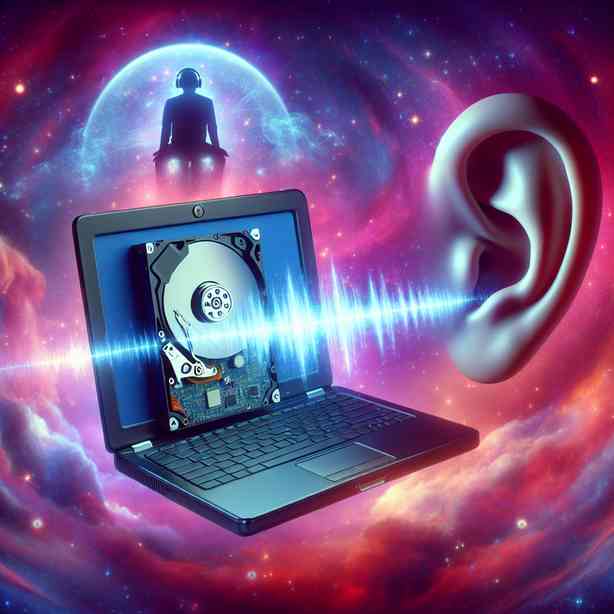
There is a unique and sometimes unsettling experience that many of us encounter when working with computers: the moment we hear our hard drive emit an unusual sound. This phenomenon, often described as a ‘cry’ of the hard drive, evokes a mix of concern, nostalgia, and curiosity. It’s a reminder of the delicate and intricate nature of technology that we often take for granted. This article explores this sound, its implications, and how to respond to it.
To understand the ‘cry’ of the hard drive, we first need to examine what a hard drive is and how it operates. At its core, a hard drive is a storage device that uses magnetic storage to retrieve and store digital information. It consists of spinning disks called platters, which are coated with a magnetic material. Data is accessed by read/write heads that float above the platters, seeking the right location to read or write data. When these components work harmoniously, we enjoy a seamless computing experience.
However, hard drives can be susceptible to various issues that may lead to the unsettling sounds we sometimes hear. These sounds can range from soft humming and clicking to more alarming grinding noises or beeping. It’s essential to understand what these sounds mean, as they are often indicators of underlying problems with the device.
One of the most common sounds is a repetitive clicking noise, often referred to as the ‘click of death.’ This sound usually suggests that the read/write heads are failing to engage correctly, which can lead to data loss if not addressed promptly. If you encounter this sound, it’s advisable to stop using the hard drive immediately and consider data recovery options.
Another sound that can invoke worry is a grinding noise. This often indicates that there is a physical issue with the platters or the read/write heads being misaligned or damaged. In such cases, it is vital to power down the hard drive without delay. Continuing to use it could exacerbate the problem and lead to complete data loss. If you are experiencing grinding noises, professional help is recommended.
It’s important to note that sounds from hard drives can also be benign. Older hard drives may exhibit certain sounds that are perfectly normal due to mechanical wear and tear. However, distinguishing between normal operational sounds and those that signal potential failure is crucial. Regularly monitoring the health of your hard drive using diagnostic tools can help you stay ahead of potential issues before they worsen.
Additionally, it’s pertinent to draw attention to solid-state drives (SSDs), which are becoming increasingly popular. Unlike traditional hard drives, SSDs have no moving parts and generally do not emit sounds in the same way. This often leads users to overlook the need for regular checks on SSDs. Nevertheless, it’s important to keep in mind that while SSDs are typically quieter and more reliable, they can still experience failures and require monitoring.
As we delve deeper into the world of data storage, it’s also essential to understand the concept of data loss. The unexpected sound of a hard drive can serve as a wake-up call about the importance of data backup. It’s easy to become complacent, assuming that our data is safe, but hard drives can fail at any time. Implementing a robust data backup plan is not just a precaution; it’s a necessity.
Regularly backing up your data allows you to recover information in case your hard drive fails unexpectedly. Whether you choose to utilize cloud storage, external hard drives, or a combination of both, ensure that your crucial files are regularly updated. Moreover, setting up automated backups can relieve the burden of remembering to do it manually.
Transitioning from the technical aspects, it’s also vital to acknowledge the emotional attachment we often have to our data. Many of us keep irreplaceable photos, documents, and personal projects on our hard drives. So, when we hear that unsettling sound, it can trigger anxiety and concern about losing precious memories and important work.
In these moments, it’s helpful to remind ourselves to remain calm. While the sound of the hard drive can indeed be alarming, taking a moment to assess the situation sensibly can lead to better outcomes. Rather than panicking, consider what you may have backed up and what steps you can take to mitigate potential data loss.
For those who may not be tech-savvy, seeking professional help may be the best course of action when your hard drive begins to cry out for attention. Data recovery specialists have the tools and expertise required to diagnose and potentially recover lost data from failing hard drives. While this service can be costly, it is often worth the investment, especially if the data is irreplaceable.
In closing, understanding the significance of the sounds our hard drives make can empower us to take proactive steps toward data preservation. When you hear the hard drive cry, remember to assess the situation carefully, consider professional help if necessary, and always prioritize regular data backups. By being aware and prepared, you can mitigate risks and ensure that your invaluable data remains safe from unexpected technical failures. Embracing these practices not only extends the life of your hard drive but also provides peace of mind in an increasingly digital world.


